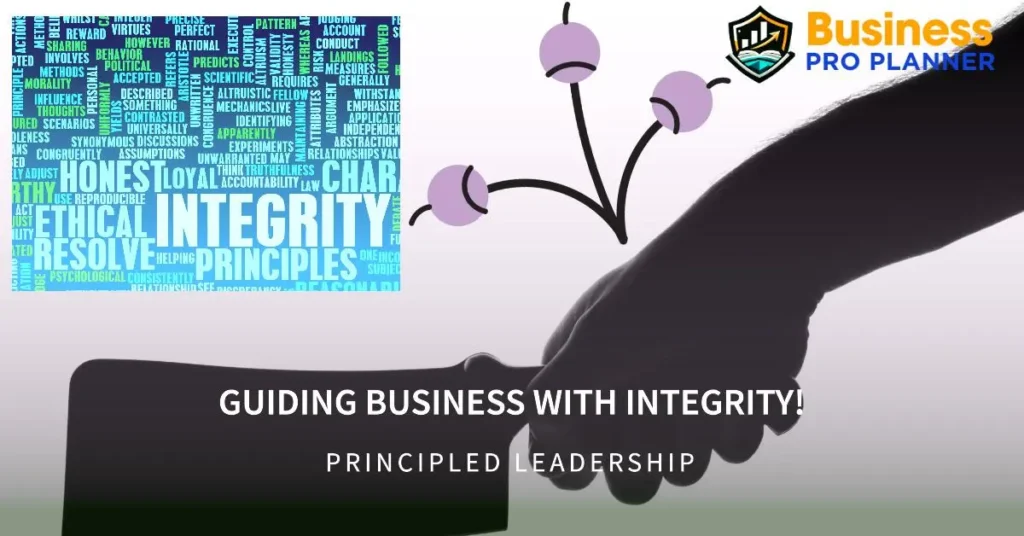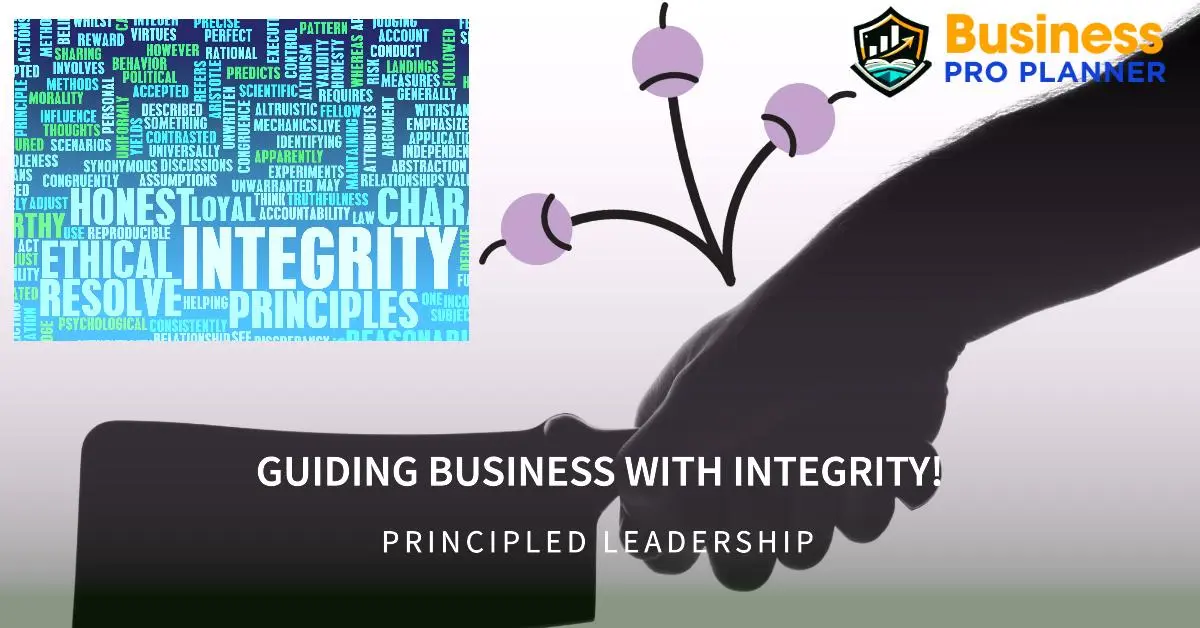Principled leadership is a critical concept in the business world today. With numerous high-profile examples of unethical business practices in recent years, there is an increased focus on the importance of ethical leadership. Principled leadership emphasizes leading with integrity, honesty, and strong moral principles.
Leaders who demonstrate principled leadership build trust, inspire others, and help create ethical organizational cultures. While leading with principles is not always easy, it results in greater employee satisfaction, higher performance, and long-term business success. This post will explore the meaning of principled leadership, its benefits, and the keys to developing this leadership approach.
What is Principled Leadership?

Leading by Values and Ethics
Principled leadership means leading with integrity and strong ethical principles. Principled leaders have a moral compass that guides their behaviors, decisions, and actions. They are values-driven, always seeking to do the right thing. Their conduct is consistent with their espoused values.
Setting the Tone for an Ethical Culture
Principled leaders understand they set the tone for ethical business conduct. Their behaviors demonstrate the standards of integrity they expect throughout the organization. They actively cultivate ethical organizational cultures, promoting ethics and values in communications, training, and policies.
Making Tough Decisions with Conviction
Life is filled with gray areas, but principled leaders dare to make difficult decisions based on their principles. They thoughtfully consider all perspectives, and then stand by their convictions even if an action is unpopular. Their commitment to doing the right thing is unshakable.
Leading by Example
Principled leaders don’t just talk about values, they live them through their actions. They walk the talk, leading by example at all times. Employees see their authenticity and are inspired to also act with integrity. Leading by example establishes trust and makes principled leadership credible.
Why Principled Leadership Matters
With countless examples of corporate misdeeds, environmental disasters, human rights violations, and other ethical failures, the need for principled leadership has never been greater. Principled leadership provides hope for more ethical businesses that benefit society. Consider the importance of principled leadership:
- Builds Trust: By consistently demonstrating ethical conduct, transparency, and honesty, principled leaders build trusting relationships with all stakeholders. Trust is the foundation for successful leadership and business outcomes.
- Upholds Ethics: Principled leaders reinforce ethics as a core business priority. Their commitment to strong values reminds employees to act ethically and yields more ethical decisions at all levels.
- Promotes Sustainability: Balancing people, planet and profits is crucial for business sustainability. Principled leaders make wise decisions that protect the environment and respect human rights across the supply chain.
- Attracts Top Talent: Workers, especially younger generations, seek employment at ethical companies. Principled leadership establishes reputations that help attract and retain talented employees.
- Drives Performance: By role-modeling integrity and creating ethical cultures, principled leaders bring out the best in employees. Workers are intrinsically motivated to meet high-performance standards.
- Ensures Long-Term Success: Unethical companies eventually fail as questionable practices are exposed. Principled leadership fosters legitimacy, stakeholder trust, and responsible growth that creates lasting success.
How to Develop Principled Leadership
Principled leadership starts with self-awareness, continual growth, and conscious choice. Some tips for developing principled leadership include:
- Know Your Values: Reflect on your core values and principles. Understand how they shape your priorities, thoughts, and behaviors. Let values like integrity, excellence, and service drive your leadership approach.
- Do the Right Thing: When facing dilemmas, take time to carefully determine the ethical path—then have the courage to take it. Don’t compromise ethics for convenience, profit, or other motives. Your principles are paramount.
- Be Authentic: Your values, words, and actions should align. Don’t profess principles you don’t demonstrate. Employees sense when leaders are inauthentic. Earn trust by walking your talk.
- Admit Mistakes: Everyone makes mistakes but principled leaders own them, apologize sincerely, and work to correct them. This accountability strengthens credibility.
- Practice Transparency: Default to openness in communications and operations. Transparency reflects integrity and prevents ethical missteps. Keep stakeholders informed and welcome tough questions.
- Make Ethics Programmatic: Don’t treat ethics as an afterthought. Develop formal programs for ethics training, reporting violations, monitoring compliance, and recognizing integrity. Infuse ethics into culture.
- Develop Morally: Read philosophy books on ethics. Study exemplary leaders. Discuss moral dilemmas with peers. Keep strengthening your ability to resolve issues ethically. Growth is ongoing.
- Find Mentors: Mentors who model principled leadership can advise you when facing difficult situations. Learn from their experience practicing values-driven leadership.
- Stay Humble: The myth of the charismatic solo leader is fading. Focus less on yourself and more on how you can empower others. Lead with humility, not as a hero.
Principled leadership delivers abundant benefits—but like any leadership approach, it has potential downsides if poorly executed. Leaders who are righteous, self-certain, or judgmental in applying ethics risk alienating others. The path of virtue requires wisdom and patience.
Examples of Principled Leadership
While no leader is perfect, many have set inspiring examples of leading with purpose, values, and integrity. Here are a few principled leaders worth studying:
- Mahatma Gandhi: Gandhi peacefully led India’s independence movement through deep commitments to non-violence, human dignity, and ethical living. His moral conviction remains a global inspiration.
- Martin Luther King, Jr.: King advanced civil rights via principled civil disobedience and his historic “I Have a Dream” vision rooted in American ideals of freedom and justice.
- Margaret Thatcher: As the U.K.’s first female Prime Minister, Thatcher demonstrated principled leadership by sticking firmly to policy beliefs like free markets, despite intense political pressure.
- Bill Gates: Guided by the principle of using his wealth to help humanity, Gates has led efforts to eradicate polio and malaria, providing over $50 billion to charitable causes via the Gates Foundation.
- Warren Buffett: Revered as an investor with strong ethics, Buffett speaks out for corporate integrity, transparent financial reporting, and fair taxation. His principles define his leadership.
While contexts differ, these leaders exemplify values-driven leadership where integrity guides moral purposes. Their principled influence persists decades later.
Developing Principled Leadership in Business
For-profit companies need principled leadership to maintain legitimacy and prevent ethical breaches. Business leaders can develop principled leadership through:
- Strong Corporate Values: Define core corporate values, then live them. Make decisions to uphold values rather than compromising for convenience or profits. Values-driven cultures prevent problems.
- Ethics Training: Train every employee on company values, ethical policies, and how to handle unclear situations. Provide ongoing development to sharpen moral reasoning skills.
- Incentives for Integrity: Tie performance reviews and bonuses to principled behaviors. Employees should be rewarded for demonstrating ethical leadership.
- Diverse Leadership: Ensure diverse representation at senior levels and on ethics committees. Different perspectives enhance deliberations about principles.
- Mentorship Programs: Pair emerging leaders with mentors who exemplify principled leadership. Mentors impart wisdom for applying ethics when challenges arise.
- Whistleblower Protection: Provide anonymous hotlines and policies to protect those reporting ethics concerns. Employees need clear ways to voice issues without fear of retaliation.
- Zero Tolerance on Retaliation: Strictly prohibit retaliation for reporting ethics problems. Those abusing whistleblowers should face termination, no matter their position.
- Independent Auditing: Utilize third-party auditors to independently evaluate ethics programs, compliance with regulations, and conformity to principles.
Leading with principles requires commitment, courage, and wisdom. While arduous, principled leadership reaps abundant benefits for businesses and society. Our world desperately needs more leaders who live, breathe, and shape organizations with unyielding ethics and values. Principled leadership must not remain the exception – it should be the norm.

Challenges of Principled Leadership
While principled leadership provides clear benefits, it also presents some distinct challenges:
- Cost of Ethics: Upholding principles like sustainability may increase costs versus cutting corners. Short-term profit sacrifices require a conviction in long-term rewards.
- Complacency Risk: After establishing a strong ethical culture, staying vigilant against complacency is difficult. Values must continually evolve and reinforcements put in place.
- Complex Decisions: Not all situations offer a straightforward ethical choice. Weighing principles against alternatives requires nuanced, thoughtful consideration of impacts.
- Resistance to Change: Transforming an existing culture takes time and patience. Addressing uncomfortable legacy issues and changing minds and behaviors is challenging.
- Short-Term Pressures: Externally, quarterly profit demands from shareholders can pressure quick fixes over principled decisions. Internal courage is needed to withstand.
- Leadership Succession: Sustaining values depends on new leaders’ embodiment. Smooth, values-aligned successions preserving culture require advanced planning.
While not easy, principled leadership’s rewards outweigh its difficulties. With commitment and community support, these challenges can be overcome.
Conclusion
Leading with principles requires commitment, courage, and wisdom. While arduous, principled leadership reaps abundant benefits for businesses and society. Our world desperately needs more leaders who live, breathe, and shape organizations with unyielding ethics and values. Principled leadership must not remain the exception – it should be the norm.
Muhammad Asif Saeed has extensive experience in commerce and finance. Specifically, He holds a Bachelor of Commerce degree specializing in Accounts and Finance and an MBA focusing on Marketing. These qualifications underpin his understanding of business dynamics and financial strategies.
With an impressive 20-year career in Pakistan’s textile sector, including roles at Masood Textile (MTM) and Sadaqat Limited, excelling in business & financial management. His expertise in financial and business management is further evidenced by his authoritative articles on complex finance and business operation topics for various renowned websites including businessproplanner.com,businesprotips.com,distinctionbetween.com, trueqube.com, and bruitly.com, demonstrating his comprehensive knowledge and professional expertise in the field.


I will right away grab your rss as I can not find your email subscription hyperlink or newsletter service.
Do you have any? Please permit me recognise in order that I
could subscribe. Thanks.
Yes, If you want to see them then click on available blog psot below link such Instagram, Facebook, and others. Thanks
Thanks